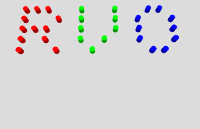
RVO2 Library: Reciprocal Collision Avoidance for Real-Time Multi-Agent Simulation
Jur van den Berg, Stephen J. Guy, Jamie Snape, Ming C. Lin, and Dinesh ManochaDepartment of Computer Science, University of North Carolina at Chapel Hill
News
RVO2 Library and RVO2-3D Library are open-source software as of May 4, 2016, released under the Apache License, Version 2.0.
RVO2 Library was featured in an interview on AIGameDev.com, April 29, 2012.
RVO2 Library appears in an article in Intel Visual Adrenaline Magazine and online at Intel Software Network, April 24, 2012.
RVO2 Library has been licensed for the video game Warhammer 40,000: Space Marine from developer Relic.
From a review of Warhammer 40,000: Space Marine in the Daily Telegraph, September 12, 2011:
"It's worth noting, however, that no matter how many orks are barreling your way (and often there will be a lot) the framerate never takes a hit."
Latest Versions
- RVO2 Library v2.0.2, released May 4, 2016.
- RVO2-3D Library v1.0.1, released May 4, 2016.
Introduction
Simulations of multiple agents sharing a common workspace have gained increasing attention recently, for various purposes such as crowd simulation, navigating a team of mobile robots, video games, studying natural flocking behavior, traffic engineering, architecture and design, emergency training simulations, etc.
We present an algorithm for interactive navigation and planning of large numbers of agents in two-dimensional (crowded) environments. At runtime, each agent senses the environment independently and computes a collision-free motion based on the optimal reciprocal collision avoidance (ORCA) formulation. Our algorithm ensures that each agent exhibits no oscillatory behaviors.
RVO2 Library is an open-source implementation of our algorithm. It has a simple API for third-party applications. The user specifies static obstacles, agents, and the preferred velocities of the agents. The simulation is performed step-by-step via a simple call to the library. The simulation is fully accessible and manipulable during runtime. The library exploits multiple processors if they are available using OpenMP for efficient parallelization of the simulation.
RVO2-3D Library is an open-source implementation of our algorithm for applications in three dimensions without static obstacles.
Third-party Python bindings for RVO2 Library and RVO2-3D Library have been implemented by Sybren Stüvel and Michael Treml, respectively.
Sponsors
This work was supported by ARO under Contract W911NF‑04‑1‑0088, by NSF under Award 0636208, Award 0917040, and Award 0904990, by DARPA and RDECOM under Contract WR91CRB‑08‑C‑0137, and by Intel. Any opinions, findings, and conclusions or recommendations expressed herein are those of the authors and do not necessarily reflect the views of ARO, NSF, DARPA, RDECOM, or Intel.
Related Links
- Highly parallel collision avoidance for multi-agent simulation
- The hybrid reciprocal velocity obstacle
- Reciprocal collision avoidance with acceleration-velocity obstacles
- Reciprocal velocity obstacles for real-time multi-agent navigation
- RVO2 Library integration with Unreal Development Kit
Relic is a trademark of SEGA, registered in the U.S. and other countries. Warhammer and Space Marine are trademarks of Games Workshop Ltd., registered in the U.S. and other countries. Warhammer 40,000 is a trademark of Games Workshop Ltd. OpenMP is a trademark of the OpenMP Architecture Review Board, registered in the U.S. and other countries. Intel is a trademark of Intel Corporation, registered in the U.S. and other countries. Other names may be trademarks of their respective owners.